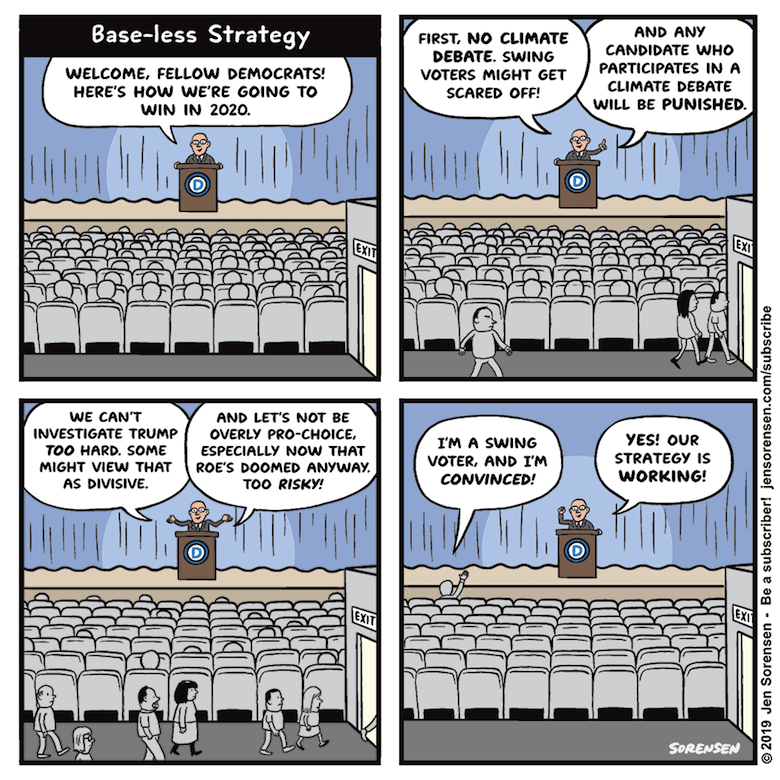I have been busy on a tight deadline with the book proofs and creating an index. These are two crashingly boring tasks, requiring close attention to detail and the only thing that keeps me going is because of my desire to make the end product as free from errors as possible. But as a result, I just could not spare the two hours or so to watch the first night of the second round of debates. So this post is based on second-hand information, so read at your peril!
However, from what I could read after the debate, it seemed to consist of Bernie Sanders and Elizabeth Warren staking out and reinforcing their progressive visions on major issues, while John Hickenlooper, Steve Bullock, Tim Ryan, and John Delaney tried to dismiss those as unrealistic and election losers. Trying to straddle the space in-between were Pete Buttigieg, Beto O’Rourke, Amy Klobuchar, and Marianne Williamson. The impression was that O’Rouke needed a big night to boost his campaign and remain viable but he did not achieve it.
[UPDATE: Robert Mackey describes how Warren and Sanders effectively swatted away the right-wing framing of the questions that looked to him like a planned ambush by CNN to discredit especially their health care plans that threaten the private health insurance industry. Mackey’s piece is well worth reading.
Rolling Stone magazine also had a good breakdown of each person’s performances in the debate.]
It seemed like Sanders and Warren both effectively batted down the attempts by the others to describe their platforms as unrealistic. Apparently Delaney’s campaign slogan is “No, we can’t” and he kept butting in a lot with his naysaying until he got a severe slap down from Warren. Watch.
Meanwhile Sanders gave Ryan a swift rebuke when Ryan tried to imply that Sanders did not kow what the Medicare for All proposal contained, to which Sanders replied, “I wrote the damn bill!”
There had been some concern among progressives that Sanders and Warren might attack each other in pursuit of the progressive vote but that did not happen. In fact, the idea that the two are appealing to the same set voters may be incorrect. An analysis of the polls suggests that their respective constituencies complement each other rather that overlap.
In poll after poll, Sanders appeals to lower-income and less-educated people; Warren beats Sanders among those with postgraduate degrees. Sanders performs better with men, Warren with women. Younger people who vote less frequently are more often in Sanders’ camp; seniors who follow politics closely generally prefer Warren.
Sanders also has won over more African Americans than Warren: He earns a greater share of support from black voters than any candidate in the race except for Joe Biden, according to the latest Morning Consult surveys.
…The fact that Warren and Sanders’ bases don’t perfectly overlap hasn’t garnered much public attention, but it’s something very much on the minds of their aides and allies.
“It shows that the media does not base their perceptions on data that is publicly available,” said Ari Rabin-Havt, chief of staff to the Sanders campaign. “I think people develop overly simplistic views of politics that presume that people who live in the real world think the same way as elite media in D.C. and New York.”
…With Biden still atop most polls, even after a widely panned performance at the first Democratic debate, some progressives still fear that Warren and Sanders could divide the left and hand the nomination to the former vice president.
“There’s a lot of time left in this campaign,” said Sean McElwee, co-founder of the liberal think tank Data for Progress. “But one thing that’s clear is that it’s very important for the left that we ensure that we don’t split the field and allow someone like Joe Biden to be the nominee.”
Another analysis looks at the difference between those voters who want big changes and those who want to go slow..
Fifty-four percent of Democratic primary voters say they prefer a nominee who proposes larger-scale policies that might cost more and be harder to pass — but could still result in major change.
Among these voters, Warren leads the pack (at 29 percent), and she’s followed by Bernie Sanders (18 percent), Biden (16 percent) and Kamala Harris (14 percent).
By contrast, 41 percent of Dem primary voters say they want a nominee who pushes for smaller-scale policies that cost less and might be easier to pass — but that bring less change.
And among these voters, Biden holds a substantial lead (at 35 percent), followed by Harris (14 percent, Warren (8 percent), Pete Buttigieg (8 percent) and Sanders (7 percent).
It is curious how Republicans campaign by appealing strongly to their base while some Democrats seem to think that the best strategy is to abandon their base and appeal to some mythical voter who is looking for a wishy-washy candidate. This cartoon by Jen Sorensen accurately captures the problem with this so-called ‘appeal to moderates’ strategy.


Will it be Sander and Warren or Warren and Sanders in 2020?
I would much prefer the latter.
hyphenman @1: That would be an awesome ticket, but one of them has to win the nomination first.
Sanders’ ego is too big to accept a VP position.
Democrats’ behavior isn’t curious if you just remember that they are clients of rich men and their corporations. The leadership’s primary purpose is to make sure that a return to New-Deal style liberalism never, ever come to pass. Keeping politicians like Sanders and Ocasio-Cortez on the sidelines is more important than winning elections. They don’t want the Democratic base motivated and active, because that base hates the leadership’s patrons. When looked at with that paradigm in mind, the Democratic leadership’s behavior is perfectly comprehensible and predictable.